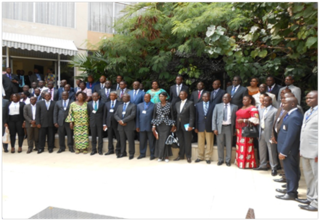Posted by Abdoulahi Mfombouot and Marie-Christine Uguen1
From 24 to 28 February 2014, Kinshasa, capital of the Democratic Republic of the Congo (DRC), hosted the 4th meeting of the Forum of Senior Budget Officials of AFRITAC Central Member Countries (FoHBAC) on the theme “Reforming the State and Consolidating Democracy through the Budget”. The meeting was attended by delegates of all the member countries,2 the main technical and financial partners supporting public financial management (PFM) reform, and members of the Congolese civil society. The meeting, co-organized by the Vice Prime Minister and Minister of the Budget of the DRC and the AFRITAC Center Coordinator, received wide media coverage.
1. Background and objectives
The Forum took place at a time when all member countries are moving towards program-based budgeting. This new approach to budgeting has already been introduced in Cameroon (2013), and preparations for its implementation are well advanced in Gabon and Congo Brazzaville. A second group of countries (Burundi, DRC and Chad) has adopted a new legislative framework and drafted implementing regulations at the same time as strengthening basic PFM systems. Reforms are still behind schedule in the third and last group of countries (Central African Republic and Equatorial Guinea) due to the security situation (CAR) and delay in the translation of the CEMAC regional guidelines into Spanish (Equatorial Guinea).
The Forum also coincided with: (i) transfer of the technical secretariat from AFRITAC Central to FoHBAC itself, with AFRITAC Central (AFC) acting as advisor to the new secretariat; and (ii) the installation of the new chair of FoHBAC (Chad replacing Gabon) for the next two-year mandate, as required by the Forum’s standing procedures.
The overall objectives of the FoHBAC are to promote exchanges of knowledge and experiences among member countries. The 4th meeting specifically aimed at: (i) raising awareness of the impact of budgetary reforms on State reform and the consolidation of democracy; (ii) promoting the development of good practices and international standards in budgetary reforms; (iii) strengthening solidarity and cooperation among member countries; (iv) consolidating the FoHBAC’s organizational structure to ensure that the Forum is established as a permanent and sustainable body.
2. Organization of the Forum
The meeting was divided into six sessions: the opening ceremony; contributions from international and regional experts; discussions of national experiences; thematic workshops; conclusions, and the closing session.
Opening ceremony
The opening ceremony was chaired by His Excellency Mr. Vice Prime Minister and Minister of Budget, DRC, in the presence of the Vice-Ministers of Finance, Plan and Budget and a number of other senior officials. The Vice Prime Minister opened the Forum after remarks from the Governor of the City-Province of Kinshasa; the chair of the FoHBAC; the DFID representative (as chair of the technical and financial partners supporting PFM reforms); and the AFC Coordinator.
Contributions from international and regional experts
The following presentations were made:
• Mr. Bacari Kone, Senior Economist, Fiscal Affairs Department (IMF) on the strategy for successful implementation of program-based budgeting, and budget decentralization.
• Ms. Marie Christine Uguen, AFC PFM resident advisor, on the new relationships between budget authorizing officers and public accountants.
• Mr. Michel Bouvier, Professor at the Université Paris I Sorbonne, on reforming the State and consolidating democracy through the budget; financial decentralization; and budget execution in program mode.
• Mr. Rémi Koussouho, public finance expert (EU office, Kinshasa), on financial decentralization in DRC.
• Mr. Jean Paul Boketsu Bofili, national economist (UNDP, Kinshassa), on citizen participation in the budget process.
• Mr. Germain Ngawen, director of budget execution in CAR’s Ministry of Finance and Budget, also representing CABRI at the Forum, on the objectives and operations of CABRI. Mr. Ngawen confirmed CABRI’s willingness to work in collaborate with FoHBAC.
Discussions of national experiences in implementing budget reforms
Each delegation presented its national experience on a specific topic, drawing out either success stories or issues where advice from other member countries was sought. The following topics were discussed:
• parliamentary discussion of the orientation of the budget (Burundi);
• budget decentralization and budget control (Chad);
• devolution of public servants’ career development and wage management to line ministries (Cameroon);
• integrated financial management information systems (Republic of Congo);
• management of public finance in a fragile State (CAR);
• mobilization, budgeting and management of external financing (DRC);
• study and programming of public investment projects (Gabon); and
• public expenditure control (Equatorial Guinea).
Thematic workshops
Four thematic workshops were organized during which participants discussed the following topics: (i) domestic arrears in the African context; (ii) advance cash accounts (“régies d’avances”); (iii) role of the administrative and financial affairs directorate (DAAF) and the forecast and studies directorate (DEP) of the ministry of finance in the context of program-based budgeting; and (iv) the structure and operations of the FoHBAC.
Participants identified the causes and consequences of domestic arrears and proposed ways to manage them in order to improve budget credibility. In this regard, the following recommendations were formulated: (i) further promote the transparency of PFM and improve the efficiency and effectiveness of public expenditure; (ii) strengthen budgetary realism; (iii) enforce penalties relating to the misuse and mismanagement of public funds; (iv) ensure that State suppliers are well informed of the terms and conditions governing contracts and payments for public purchases; and (v) arrangements for settling domestic arrears (including external census and audit, discharge criteria, methods of settlement and payment plans).
It was agreed that advance cash accounts should be limited to a maximum amount (to be specified in the Finance Act), only be used for small-scale expenses, and be strictly controlled. A particular focus was put on the evolution of the respective role of the DAAF and DEP directorates which should no longer manage credits. These directorates should support the delegated authorizing officers responsible of the programs concerned, and consolidate budgetary information within line ministries.
Following the transfer of FoHBAC’s technical secretariat to member countries, the need to amend the Forum’s structure and operations was discussed and resolutions were adopted at the end of the Forum.
Main lessons learned
The main lessons of the Forum were as follows:
• High level political commitment is essential for the success of PFM reforms;
• Such reforms, if well designed and implemented, can have a significant impact on the modernization of the State and the consolidation of democracy;
• Strengthening core PFM functions and governance is a prerequisite for the transition to program-based budgeting. This transition is a medium- to long-term objective and requires a clear vision on the direction for reforms, a suitable legal framework, proper institutional structure and resources, and a good training and communication plan;
• Implementation of program-based budgeting also requires the involvement of all actors, including lines ministries and the parliament;
• The new relationships between authorizing officers and public accountants require that the processes of public accounting be redefined and that functional and structural links between the actors be strengthened;
• New capital investment projects should be subject to a prior feasibility study and a rigorous selection process before their inclusion in the budget. The experience presented by Gabon is interesting in this regard;
• Financial decentralization requires the transfer of accountability and managerial autonomy to local authorities, along with financial autonomy. It requires also a close collaboration between the authorities in central and local government, and substantial capacity building at local level.
Recommendations and resolutions
The main recommendations arising from the Forum may be summarized as follows:
• Ensure a strong political commitment to reform;
• Improve PFM core functions and governance;
• Design, control, communicate and build capacity for program-based budgeting;
• Promote citizen participation in the budget process;
• Implement effective financial management information systems and involve IT professionals in the design of the PFM reform.
The FoHBAC delegates agreed on the following resolutions:
• A provisional technical secretariat to be installed under the supervision of Chad which will chair the FoHBAC for the next two years—AFC support is crucial for the establishment of the secretariat;
• The DRC to assume the position of Vice-Chair of FoHBAC ;
• The mandate of the provisional technical secretariat to expire during the 5th meeting of the Forum;
• Under the authority of the chair, the provisional technical secretariat to review the statutes and procedures of the FoHBAC and prepare the organization of the Forum’s 5th meeting in collaboration with the host country and AFRITAC Central;
• The question of the representativeness of member country delegates will be addressed when reviewing the statutes of FoHBAC;
• The 5th meeting of FoHBAC will take place in January 2015 in Malabo, Equatorial Guinea; the 6th meeting will take place in 2016 in Cameroon;
• The organizational costs of the 5th meeting to be borne by the member countries.
1 PFM Resident Advisors, AFRITAC Central.
2 Comprising Burundi, Cameroon, Central African Republic, Chad, Congo Brazzaville, DRC, Equatorial Guinea, and Gabon.
Note: The posts on the IMF PFM Blog should not be reported as representing the views of the IMF. The views expressed are those of the authors and do not necessarily represent those of the IMF or IMF policy.






